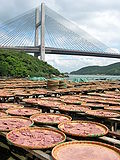Shrimp paste
Shrimp paste or shrimp sauce is a fermented condiment commonly used in Southeast Asian, Northeastern South Asian and Southern Chinese cuisines. It is primarily made from finely crushed shrimp or krill mixed with salt, and then fermented for several weeks. They are either sold in their wet form or are sun-dried and cut into blocks for sale.
History[edit]
The use of shrimp paste in Asian cooking is believed to date back to the 16th century, when it was first used as a flavor enhancer in Chinese cuisine. It was later adopted by other Asian cultures, including those in Thailand, Vietnam, Malaysia, and the Philippines.
Production[edit]
Shrimp paste is made by fermenting ground shrimp with salt. The mixture is left to ferment for a few weeks, during which time it develops a strong, pungent smell. After fermentation, the paste is usually sun-dried, which helps to intensify its flavor. In some regions, the paste is instead roasted or smoked.
Uses[edit]
Shrimp paste is used as a flavoring in a variety of dishes, including curries, soups, and stir-fries. It is also used as a base for many sauces and dips. In some cultures, shrimp paste is even used as a spread on bread or crackers.
Varieties[edit]
There are many different varieties of shrimp paste, each with its own unique flavor profile. Some of the most popular include:
- Belacan: A Malaysian shrimp paste that is typically toasted before use.
- Bagoong: A Filipino shrimp paste that is often pink in color and has a slightly sweet flavor.
- Mam tom: A Vietnamese shrimp paste that is typically used as a dipping sauce.
- Kapi: A Thai shrimp paste that is used in a variety of dishes, including the popular green papaya salad.
Health Benefits and Risks[edit]
Shrimp paste is high in protein and contains a variety of vitamins and minerals. However, it is also high in sodium, which can contribute to high blood pressure and other health problems if consumed in excess.
See Also[edit]
References[edit]
<references />
This Asia-food related article is a stub. You can help WikiMD by expanding it.
Shrimp_paste[edit]
-
A square of shrimp paste from Hung Kee store
-
Drying shrimp paste
-
Shrimp paste Belachan
-
Ginisang alamang (sauteed shrimp paste) - Philippines
-
Philippine shrimp paste
-
Burong Hipon
-
Belachan or Terasi Bangka
-
Kapi Chiang Mai Warorot Market
Ad. Transform your life with W8MD's Budget GLP-1 injections from $75


W8MD offers a medical weight loss program to lose weight in Philadelphia. Our physician-supervised medical weight loss provides:
- Weight loss injections in NYC (generic and brand names):
- Zepbound / Mounjaro, Wegovy / Ozempic, Saxenda
- Most insurances accepted or discounted self-pay rates. We will obtain insurance prior authorizations if needed.
- Generic GLP1 weight loss injections from $75 for the starting dose.
- Also offer prescription weight loss medications including Phentermine, Qsymia, Diethylpropion, Contrave etc.
NYC weight loss doctor appointmentsNYC weight loss doctor appointments
Start your NYC weight loss journey today at our NYC medical weight loss and Philadelphia medical weight loss clinics.
- Call 718-946-5500 to lose weight in NYC or for medical weight loss in Philadelphia 215-676-2334.
- Tags:NYC medical weight loss, Philadelphia lose weight Zepbound NYC, Budget GLP1 weight loss injections, Wegovy Philadelphia, Wegovy NYC, Philadelphia medical weight loss, Brookly weight loss and Wegovy NYC
|
WikiMD's Wellness Encyclopedia |
| Let Food Be Thy Medicine Medicine Thy Food - Hippocrates |
Medical Disclaimer: WikiMD is not a substitute for professional medical advice. The information on WikiMD is provided as an information resource only, may be incorrect, outdated or misleading, and is not to be used or relied on for any diagnostic or treatment purposes. Please consult your health care provider before making any healthcare decisions or for guidance about a specific medical condition. WikiMD expressly disclaims responsibility, and shall have no liability, for any damages, loss, injury, or liability whatsoever suffered as a result of your reliance on the information contained in this site. By visiting this site you agree to the foregoing terms and conditions, which may from time to time be changed or supplemented by WikiMD. If you do not agree to the foregoing terms and conditions, you should not enter or use this site. See full disclaimer.
Credits:Most images are courtesy of Wikimedia commons, and templates, categories Wikipedia, licensed under CC BY SA or similar.
Translate this page: - East Asian
中文,
日本,
한국어,
South Asian
हिन्दी,
தமிழ்,
తెలుగు,
Urdu,
ಕನ್ನಡ,
Southeast Asian
Indonesian,
Vietnamese,
Thai,
မြန်မာဘာသာ,
বাংলা
European
español,
Deutsch,
français,
Greek,
português do Brasil,
polski,
română,
русский,
Nederlands,
norsk,
svenska,
suomi,
Italian
Middle Eastern & African
عربى,
Turkish,
Persian,
Hebrew,
Afrikaans,
isiZulu,
Kiswahili,
Other
Bulgarian,
Hungarian,
Czech,
Swedish,
മലയാളം,
मराठी,
ਪੰਜਾਬੀ,
ગુજરાતી,
Portuguese,
Ukrainian







